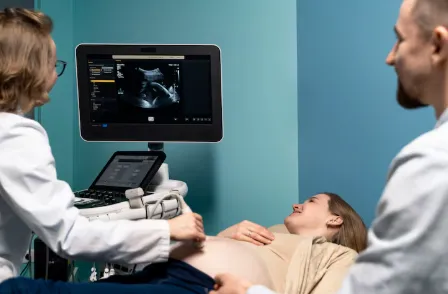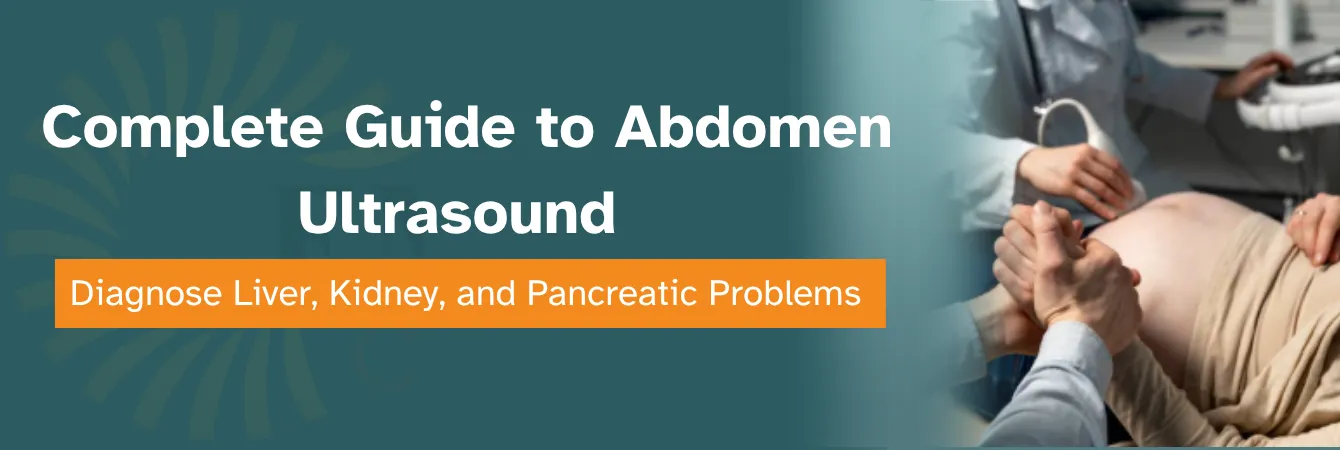Know About Abdominal Ultrasound - Diagnose Liver, Kidney & Pancreatic Problem
- July 19, 2025
- Abrol Hospital
Introduction: What Is an Abdominal Ultrasound?
An abdominal ultrasound uses high-frequency sound waves to create images of the organs inside your abdomen. It helps your doctor detect any issues inside your body.
An abdominal ultrasound is one of the most painless, non-invasive diagnostic tools used in modern medicine. It’s especially helpful in checking out organs in the belly area and is commonly used to diagnose everything from gallstones to liver problems. If you’re in Gurdaspur and searching for reliable and affordable ultrasound services, Abrol Hospital is one of the top places to consider.
Why Ultrasound Is Performed?
Most of the Doctors specially Expert Gastrorentrologist rely on abdominal ultrasounds for a wide variety of reasons. This scan helps identify the root cause of unexplained abdominal pain, bloating, or a feeling of fullness. It’s also used to examine symptoms like jaundice, blood in urine, or persistent vomiting. If there’s suspicion of gallstones, kidney stones, liver disease, or abdominal tumors, this scan can confirm it. In addition, doctors may use it to monitor the progress of ongoing treatments or check for internal bleeding after an accident. It’s a versatile tool, especially when it comes to evaluating the liver, pancreas desease, kidneys, spleen, bladder, and gallbladder.
How Ultrasound Helps in the Early Diagnosis?
One of the main benefits of getting an abdominal ultrasound early is the ability to catch serious health issues before they become dangerous. Conditions like fatty liver disease, abdominal tumors, or gallbladder stones can often go unnoticed until symptoms worsen. Ultrasound allows for early identification, which means treatment can begin sooner and outcomes are typically better. Moreover, early diagnosis helps reduce long-term healthcare costs by avoiding emergency situations or surgeries.
How to Prepare for an Abdominal Ultrasound?
Fasting Guidelines: Doctors generally advise fasting for 6–8 hours before the scan. Food and gas in the stomach can interfere with sound wave transmission, leading to blurry images. Water is allowed, and in some cases, encouraged—especially if the bladder needs to be full for better visibility.
What to Wear and Bring: Wear loose, comfortable clothing. You may be asked to lift or remove your shirt, so two-piece outfits are recommended. Bring your ID, doctor’s referral, and any previous scan reports if applicable. This helps the radiologist compare findings and spot changes.
Medication Instructions: Continue taking prescribed medication unless advised otherwise. However, be sure to inform the radiologist about all medications you’re on—some can affect your liver or kidney function, and the technician may adjust scanning angles accordingly.
The Procedure of Abdominal Ultrasound: What to Expect
Step-by-Step Walkthrough
Once you enter the ultrasound room, you’ll be asked to lie down on your back. A warm or cold gel is applied to your abdomen. The technician then uses a transducer to move over your belly in circular motions. The probe captures images, which appear on the screen. Sometimes you’ll be asked to take a deep breath or hold still. The scan is smooth, and you won’t feel anything beyond slight pressure.
Duration and Comfort Level: The scan is over in less than half an hour. Most people feel no discomfort at all. The gel may feel sticky, but it’s wiped off afterward, and you’re good to go. It’s one of the most comfortable diagnostic tests available.
Post-Scan Guidelines: There are no specific restrictions after an ultrasound. You can return to eating, drinking, and performing daily activities immediately unless your doctor instructs you otherwise based on the findings.
How Soon Will You Get Your Report?
Most reports are ready within a few hours or by the next working day. If needed urgently, you can request an expedited report—Abrol Hospital often accommodates such requests.
Your report includes images and descriptions of organ conditions. If anything abnormal is spotted, the report will mention it in detail. Based on this, our consultant or Gastrorentrologist will decide whether you need further tests or treatment.
Who Needs an Abdominal Ultrasound?
Symptoms That May Require Scanning: If you’ve been experiencing consistent abdominal pain, swelling, or digestion issues, it might be time for an ultrasound. Other signs include yellowing of the eyes or skin (jaundice), blood in urine, unexplained vomiting, or significant weight loss. Don’t ignore these warning signs—early scanning can prevent complications.
High-Risk Patients: Patients with diabetes, high blood pressure, alcohol addiction, or a history of liver or kidney disease should undergo routine ultrasounds to monitor internal health. These conditions can silently affect organs over time, and ultrasound helps keep track of any changes.
Routine Check-Ups for Seniors: For seniors, periodic abdominal ultrasounds are a smart preventive measure. As we age, organs become more susceptible to disease, and early detection through imaging can be a lifesaver. In fact, many doctors recommend annual scans after age 60, especially for patients with chronic conditions.
Abdominal Ultrasound at Abrol Hospital, Gurdaspur
Why Choose Abrol Hospital?
Abrol Hospital in Gurdaspur has built a reputation for affordable, quality diagnostics. It stands out for its commitment to patient care, high standards of hygiene, and qualified medical staff. With years of experience in radiology, they offer reliable results with minimal waiting time. Patients choose Abrol because it combines affordability with expertise—a rare combination in smaller cities.
Advanced Equipment and Skilled Radiologists
At Abrol Hospital, ultrasound machines are updated with the latest digital technology, offering better resolution and faster processing times. The team includes certified radiologists who bring both knowledge and experience to the table. This ensures that your reports are accurate, detailed, and clinically useful.
Patient-Friendly Environment
From the moment you enter the facility, you’re treated with respect and empathy. Staff members are trained to guide you through the process clearly, especially if you’re undergoing an ultrasound for the first time. Waiting areas are clean and air-conditioned, and appointments are well-managed.
Cost of Abdominal Ultrasound in Gurdaspur
The cost of an abdominal ultrasound can vary widely depending on several factors. Key reasons include the quality of imaging equipment, the expertise of the radiologist, and whether additional consultations or evaluations are part of the service. Advanced machines often provide clearer images, and experienced radiologists deliver more precise assessments.
If you’re seeking reliable and patient-friendly diagnostics, Abrol Hospital ensures accuracy, transparency, and comfort throughout the ultrasound process.
Get the Accurate Results — Book Your Appointment for Abdominal Ultrasound Today
Don’t ignore signs like digestive issues or abdominal discomfort. An ultrasound is a quick, safe, and non-invasive way to understand what’s going on inside your body. At Abrol Hospital, we offer expert imaging services with advanced technology and compassionate care.
Early detection makes all the difference—contact us today or walk in for a fast and confidential scan. Your health deserves clarity.

FAQs About Kidney Stones Symptoms
Yes, absolutely. Abdominal ultrasound is widely regarded as one of the safest diagnostic tests available. It does not use radiation and is safe for all age groups, including infants, seniors, and pregnant women. In fact, it's often the preferred imaging method during pregnancy for both fetal and maternal health checks.
If your scan detects abnormalities such as fluid accumulation, organ enlargement, cysts, or tumors, your doctor may recommend additional tests like blood work, CT scans, MRIs, or even a biopsy to confirm the diagnosis. Early detection through ultrasound allows for timely intervention, often improving long-term outcomes.
While ultrasound is excellent for detecting many abdominal conditions, it may not catch every disease. For example, early-stage tumors deep within an organ or certain vascular conditions may require CT or MRI for better clarity. Still, ultrasound is typically the first and most accessible imaging step.
Choose a diagnostic center or hospital that is well-rated, has qualified radiologists, and uses modern equipment. Abrol Hospital offer a combination of expertise, affordability, and convenience, ensuring accurate results and better patient care.
Preparation typically includes fasting for 6 to 8 hours prior to the scan, especially if your liver, gallbladder, or pancreas needs to be evaluated. This helps minimize gas and allows for clearer images. However, for kidney or bladder-focused scans, you may be asked to drink water and have a full bladder. Always follow your healthcare provider’s specific instructions.



